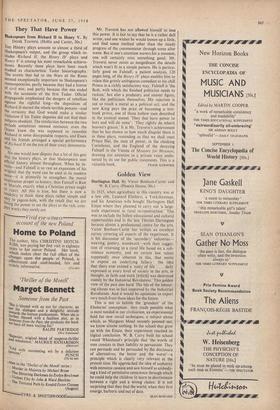Golden View
IN 1925, when agriculture in this country was at a low ebb, Leonard Elmhirst, a Yorkshireman, and his American wife bought. Dartington Hall, Estate where they planned to carry out 'a large- scale experiment in rural re-construction.' This was to include the fullest educational and cultural opportunities and in the late Thirties Dartington became almost a professional centre for the arts. Victor Bonham-Carter has written an excellent survey covering all aspects of the experiment. It is his discussion of the 'secondary' industries— weaving, pottery, woodwork—with 'their sugges- tion of returning to a rural life based on a sub- sistence economy, and on certain lost values supposedly once inherent in this, that seems to expose an underlying fallacy : the idea that there ever existed a 'unity of life . . . daily expressed at every level of society in the arts, in thought, in faith and work [which] was destroyed mainly by the Industrial Revolution.' This golden view of the past dies hard. The life of the labour- ing classes was in fact improved by the Industrial Revolution. And it would be optimistic to expect very much from these ideas for the future.
This is not to belittle the 'grandeur' of the Elmhirsts' conception : they made possible what is most needed in our civilisation, an experimental field for new social techniques, a subject about which, as Margaret Mead recently pointed out, we know almost nothing. In the school that grew up with the Estate, their experiment reached its logical conclusion. W. B. Curry built his school round Whitehead's principle that 'the worth of men consists in their liability to persuasion. They can persuade and be persuaded by the disclosure of alternatives, the better and the worse'—a principle which is clearly very relevant at the present time. He approached the idea of authority with immense caution and saw himself as embody- ing a kind of perrhissive conscience through which he could help the children to learn to discriminate between a right and a wrong choice. It is not surprising that they find the world, when they first emerge, barbaric and out of date.
JEAN HOWARD


































 Previous page
Previous page